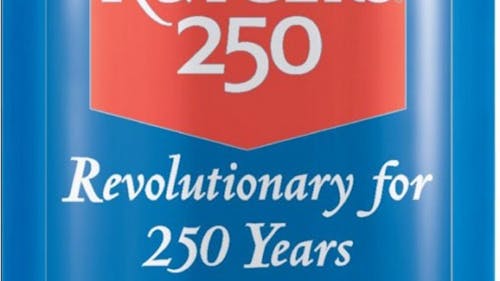Pepsi commemorates Rutgers with honorary can

Students might see a familiar logo in an unfamiliar place the next time you crack open a can of Pepsi.
Following a collaborative project with Rutgers’ Dining Services and the Rutgers 250 Committee, PepsiCo has begun releasing 4 million special edition Pepsi cans branded with the Rutgers 250 logo.
Production of the cans began in December.
The project is the result of about two years of work between Rutgers and PepsiCo, said Joseph Charette, executive director of Dining Services for the University.
“I kind of planted the seed back (in 2014) to say, ‘Wouldn’t it be fantastic when we celebrate our 250th anniversary if we can have something on a Pepsi can commemorating this historic event,’” Charette said.
The 4 million cans will be produced at the PepsiCo bottling plant in Piscataway, Charette said. From that facility, the cans will be distributed throughout New Jersey and the Delaware Valley.
The campaign has no extra cost for Rutgers, Charette said.
Pepsi has also branded a number of delivery trucks with the Rutgers 250 logo.
“There’s 25 Pepsi delivery trucks all around the New York metropolitan area that are going to be carrying these marks on their backs,” Charette said. “Everywhere they go, driving all around the tristate area, you’re going to see this Rutgers logo.”
PepsiCo currently holds a contract with Rutgers that, among other things, makes PepsiCo the sole provider of beverages on the Rutgers campuses.
“The partnership works on what they call a ‘request for proposal.’ The first partnership we ever had was with Coca-Cola and it was for 10 years,” Charette said. “We’re in that process again now to see who will be the vendor in the future.”
PepsiCo and the Coca-Cola Company are the only two corporations large enough to bid for the Rutgers contract. The goodwill provided by this campaign is not a consideration in future contracts, Charette said.
This is not the the first time that Rutgers-branded Pepsi cans have been released.
In 2014, Pepsi cans branded with the Rutgers’ home football schedule were released to celebrate Rutgers’ entry into the Big Ten, Charette said.
Inspired by a similar campaign carried out by Coca-Cola in collaboration with another school, Charette said she mentioned the idea to members of the PepsiCo marketing staff, who promptly agreed.
“For us it's a matter of saying, ‘Look, we’re in the Big Ten, we’ve moved onto a bigger more prestigious football league, we want everyone to know it,’” Charette said. “They’re going to put the Pepsi in the can regardless. If they’re willing to have it marked slightly different I don’t think that costs them any more.”
The Rutgers 250 can campaign is just one part of the celebration of Rutgers’ 250th anniversary, said Matthew Weismantel, senior director of the Rutgers 250 office within the Department of University Communications and Marketing.
“(The 250th anniversary is) a real opportunity for an institution like ours to recommit ourselves to our core values, our core goals and mission,” Weismantel said. “At the same time (we) allow people to go, ‘Wow we’ve been here for a while.’”
Previous celebrations include a Byrne seminar focused on examining how food has changed in the Rutgers area, a Rutgers 250 app that provides snippets of Rutgers history every day and the installation of several celebratory statues, Weismantel said.
Founded shortly before the Revolutionary War, Rutgers has survived and prospered, even in the face of adversity, Weismantel said.
“So here's this brand new school, and where are we? Right in the middle of the devastation. The fact that we survived is a major celebration point,” Weismantel said. “The fact that we could’ve evolved so far from where we were at the very beginning to do the things that we’re doing today is exciting.”
Weismantel said he was proud of Rutgers’ progress through the centuries.
“As an institution going from 1766 to now … in comparison to many other schools we have changed enormously,” Weismantel said. “I don't think ... there's another institution that started as a colonial school … became a private college, became a state college, became the state university then became a comprehensive research university.”



